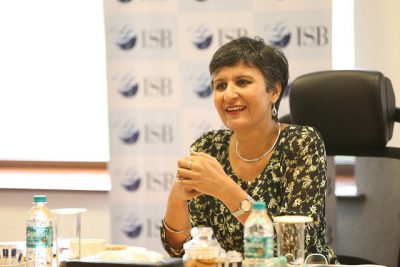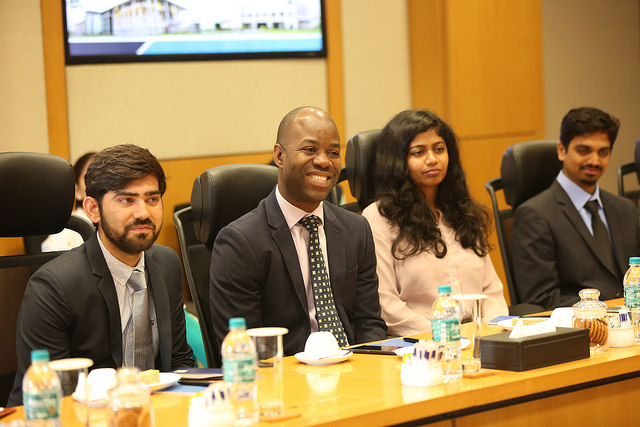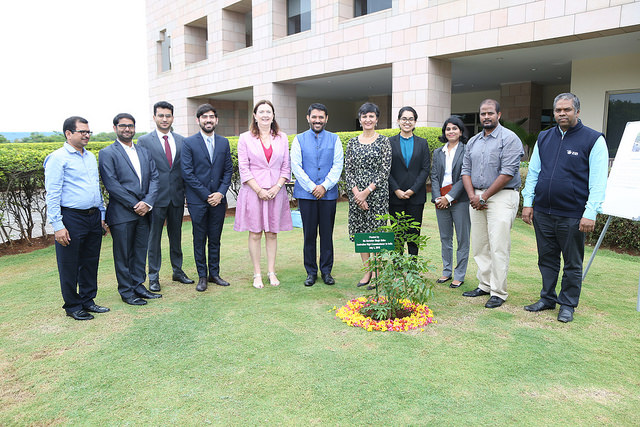
“Accounting is the best
shield any system has against corruption.”
These were words spoken at the very outset by Her Eminence, Ms. Harinder Sidhu, right after the initial round of introductions with a bunch of future MBA graduates. One could easily estimate that this was going to be an insightful interactive session. It was her first visit to the Hyderabad Campus of Indian School of Business and was accompanied by fellow diplomat and Australian Consul General in Chennai, Ms Susan Grace.
Representing ISB were the Deputy Dean, Directors of Admissions and Marketing Communications teams along with a few other officials, and a contingent of 12 students representing the Public Policy Club, Women in Business Club, Debating Club and the Marketing Communications Council of the GSB. In an expansive discussion over tea, the HC enlightened the gathering with her experience , She took on a plethora of domains ranging from climate change to women leadership to immigration into Australia and even sports. Throughout the session, the HC was at her candid best and was brimming with enthusiasm to speak on any topic that was raised during the discussion.
A senior diplomat, Ms. Sidhu spoke about her ancestry (and the India connection) and thereafter her journey through the ranks of the Australian Foreign Service, and the challenges she had to encounter therein. She was extremely upbeat about promoting leadership initiatives for women and working with ISB in programs such as the Women In Leadership and Entrepreneurship (WLEP).
She mentioned how the times have indeed taken a course for the better back in her homeland for women leaders – be it in the government or otherwise, and how India was showing a positive trend in that regard, although much remained to be accomplished in the years to come.
In the domain of public policy too, she took a keen interest in learning about ISB driven initiatives such as India Insights and spoke at length about how young business graduates have substantial pedigree on offer to tackle some of the core issues crippling efficient administration of a nation state.
Recounting a few memorable anecdotes from her journey, she expressed how she had been a part of multiple federal budgets and fiscal policy drafting committees, how she handled the 9/11 crisis being a part of the PM’s defense and security team (with the PM being in Washington himself when the fateful incident took place), and how thereafter, she was an integral part of the team that oversaw an overhaul of the Australian Intelligence framework.

The topics that probably gained maximum traction during the discussion were Climate Change and the role of China in the Asia-Oceanian landscape in particular, and the world- scape in general. As for climate change, the HC highlighted how it is much easier proselytised than enacted into policy bindings due to the tremendously unexplored grey areas in the subject when it came to societal consciousness.
She reiterated that it never was a dichotomy of either being for or against – as is projected in International summits like the ones in Kyoto or Paris and how the internal struggles are rather disparate than what meets the foreign eye. On the topic of China relations, the HC mentioned that the underlying and overarching theme which defines country relations, especially for a nation like hers that is heavily dependent on imports of a wide genre of things, trade relations define the crux of the relationship between any country and theirs. And that is where China emerges as a power player not only in this context but globally so.
However, she did reiterate that fundamentally the Indo-Australian relation over time has developed organically and has been buttressed with a “live and let live” approach when it comes to diplomatic ties.
She envisioned this bond growing only stronger in the years to come. She also mentioned about how she believed in the importance of India as a strategic partner to Australia, and how she herself chose to be posted as the HC here after rejoining the foreign service office back in 2013, after donning multiple hats in different government functions.

In the Q&A session towards the end, there were a wide variety of domains touched upon which prominently included sports in India and how Australia could play a role in helping India look beyond cricket. The HC expressed delight in the progress she witnessed upon her visit to an SAI Regional Centre in Chandigarh wherein visiting Australian coaches from a range of sporting domains continually assessed and assisted Indian athletes.
She saw it as an avenue of exploration that would only get better with time. The HC was also asked about Australia’s take on immigration and specifically the migration from the sub-continent, to which she replied that post the 1970s, Australia has welcomed immigrants in the form of students as well as skilled workers with arms wide open, and shall continue to do so. She mentioned the dearth of software engineers on Aussie soil and how India is contributing and needs to keep playing a major role in helping them shore up the necessary technical workforce. The migration of unskilled workers, however, remained a hotly contested area in Australian politics and it was difficult to ascertain a definite outcome to it.
By the time it was occasion to bid goodbyes and click a few farewell photographs together (including selfies), there had been an excellent flow of information on topics of significance as well as light-hearted ones, and everyone present did sport visible delight to have been a part of the session – the students and team ISB – absorbing the knowledge and sharing the insights aplenty; and the diplomats taking their understanding and love for this vibrant nation of ours, at least a tiny notch higher.
Syed Shakeel Imdad
PGP Class of 2019

